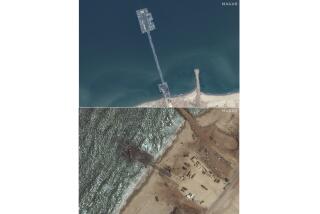The Line Stretches Nearly a Mile for Military Stipends in Baghdad
- Share via
BAGHDAD — How do you pay 400,000 soldiers in a country without checks, without banks and without an army paymaster?
It takes a long time, a long line and a lot of cash.
Since July 15, American GIs have been overseeing the distribution of stipends to the officers, soldiers, veterans, widows and wounded of the now disbanded Iraqi national army -- the same army they were battling a few months ago.
In Baghdad, the largest of eight payout stations nationwide, the line was nearly a mile long Monday as troops and Iraqis hired for the program finally finished up the first phase.
U.S. military police, some wielding ax handles, worked to keep order as temperatures climbed above 115 degrees. There was pushing and shoving that at times seemed to border on a riot, but somehow the job was getting done.
The top civil administrator in the U.S.-led occupation authority, L. Paul Bremer III, officially dissolved the army in May, a move that generated bitterness among Iraqis who said that the army was not to blame for the abuses of ousted President Saddam Hussein and that millions of dependents of Iraqi soldiers and officers would suffer if the troops were not paid.
A series of protests, including one that turned violent, caused Bremer to offer monthly stipends to Iraqi military personnel until other means could be found to reintegrate them into postwar Iraq. The stipends range from $150 for general officers to $50 for ordinary soldiers.
In Baghdad, as of Monday, $6.8 million had been handed out to 113,000 people, said Capt. Kevin Brown, a company commander in the U.S. Army’s 1st Armored Division, 2nd Brigade, from Mission Viejo. Twelve thousand came through Sunday, he said, and he expected that the total would be about the same Monday.
The whole operation has been planned with near military precision. To receive the money, Iraqis have to show military identification cards or other documents proving their service, produce a second form of ID, then sign statements in which they renounce the former ruling Baath Party and agree not to oppose occupation forces in Iraq.
At the Baghdad station, on the vast grounds of a former airport where Hussein had started to build the world’s largest mosque, the crowds are funneled into narrow lanes made of cinderblocks until they reach various stations where they complete each step. U.S. soldiers do not actually handle the money. That is done by 160 Iraqis hired for the job.
Brown pointed out that the money did not come from the pockets of American taxpayers but from seized currency of the old regime.The payments are an important step toward stabilizing Iraq, Brown said. “We now have 113,000 guys who have good reason not to cause problems.”
Hearing gunshots in the distance, Brown remarked that stray bullets often land inside the compound -- potshots apparently fired from adjoining neighborhoods. He acknowledged that there had been other problems. At the gate to the compound Monday, two Iraqis who were accused of instigating disturbances in the line were detained by soldiers and sat forlornly under guard, while a third was being brought in.
“The excitement of getting free money is a challenge we have to deal with,” Brown said.
As often happens in Iraq, there was a wide gap in perceptions between the Americans struggling to perform the operation, and feeling pretty good about the results, and Iraqis who expected more from a superpower like the United States.
The glass half-empty was epitomized by Salah Lami, an officer in the former army, who tried for the second day Monday to get his pay, and gave up after standing in line for nearly nine hours.
Lami, a tall, cleanshaven man with graying temples, arrived at the Baghdad pay station at 5:20 a.m. and walked off in frustration at 2 p.m. During that time, he said, the line hardly budged.
Even arriving shortly before dawn had not put him at the front of the queue, he said, because so many people had camped out at the site the night before.
Lami, who missed a previous payday set aside for officers, said it was humiliating for him, a colonel, to be forced to stand in line with common soldiers. He also complained that military personnel were owed pay for March, April, May and June but that the authority was giving out stipends for only one month. (Brown said a three-month stipend would be distributed beginning Aug. 15, using a list created from the July payout.)
“My colleagues and I sweated in the heat and we did not get a thing,” Lami said. “Iraqis by nature are very patient, but patience has its limits. When they run out of patience, it is going to be very hard on us and very hard on the Americans.”
Others were more good-natured during their wait.
“We deserve all this from the Americans and more,” joked one man in the line who was overheard by an interpreter working with The Times. When a companion asked him to explain, he replied, “Because we did not fight them.”
More to Read
Sign up for Essential California
The most important California stories and recommendations in your inbox every morning.
You may occasionally receive promotional content from the Los Angeles Times.










